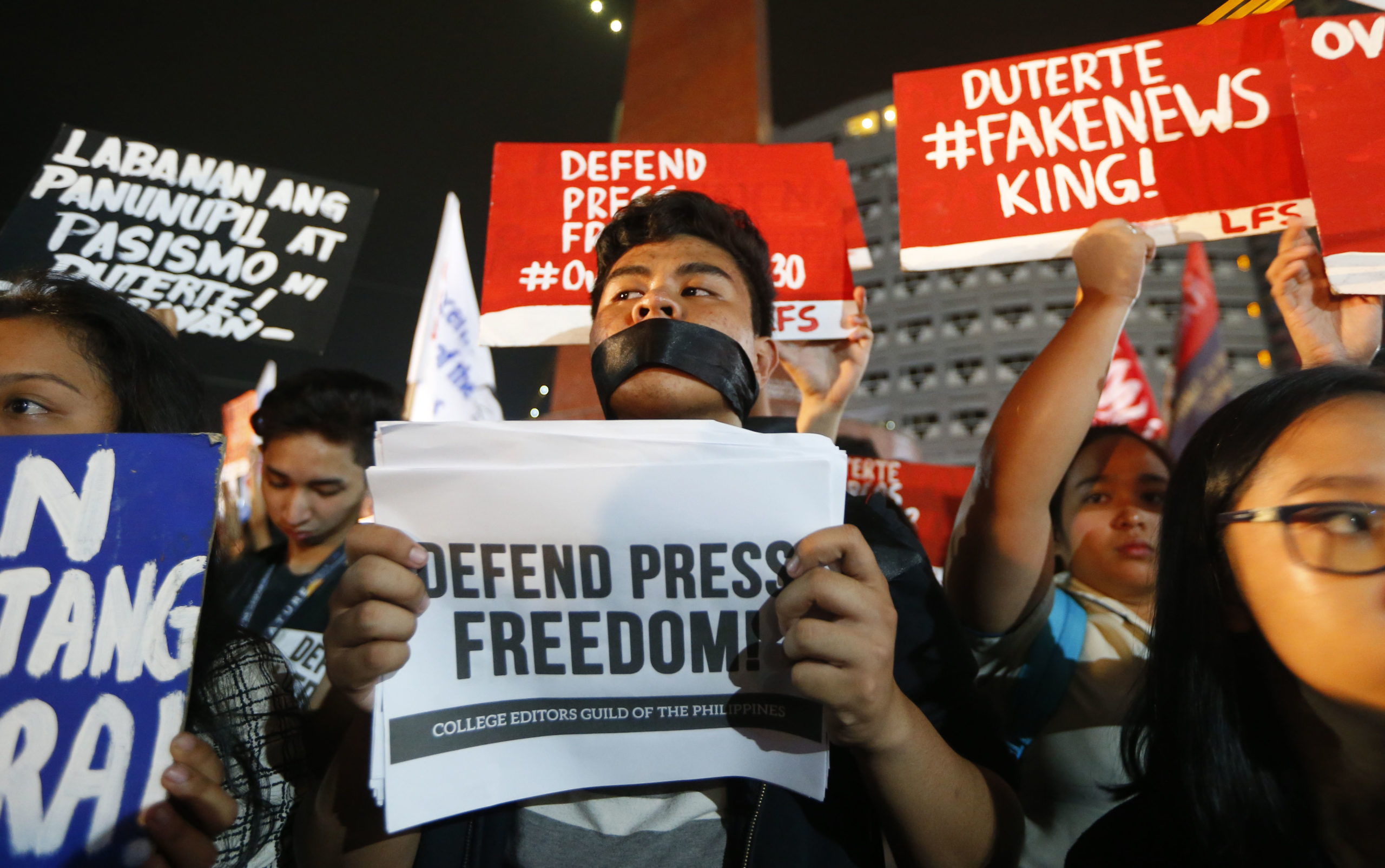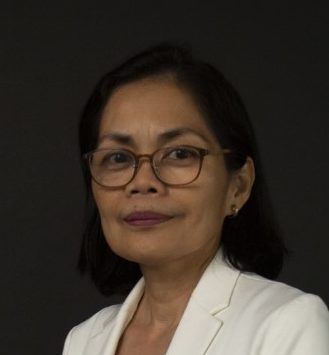
Journalists and supporters display their messages during a protest against the recent Securities and Exchange Commission's revocation of the registration of Rappler, an online news outfit, northeast of Manila, Philippines, Jan. 2018
A day after Ferdinand Marcos Jr. was proclaimed president of the Philippines on May 25, he granted an interview to only three reporters while his spokesperson faced the rest of the media that day.
Two of the lucky ones belonged to partisan broadcast networks owned by church leaders who had backed Marcos’ presidential bid, including a doomsday preacher wanted by the U.S. Federal Bureau of Investigation for human trafficking.
In the world we used to know, a massive election victory would make any candidate magnanimous. It didn’t seem that way in the Philippines. When it looked certain that Ferdinand Marcos Jr., heir to the late Philippine dictator Ferdinand Marcos, had won the May 9, 2022, presidential race by a landslide, his spokesperson held a press conference where he snubbed our Rappler reporter’s questions six times, each time turning his eyes and attention to others in the room.
Not long after, the president-elect named a prominent vlogger, who often lambasted journalists under the Duterte era, as his press secretary; she also happens to be a lawyer who was once suspended for three years by the Supreme Court for being remiss in her duties to a client. When asked, she said, yes, she would push for the accreditation of bloggers and vloggers to the Malacañang Press Corps, the once-elite club of reporters assigned to cover the presidency.
Is this a portent of things to come under the Marcos presidency, or just a hangover from a campaign that pushed aside journalists and favored social media influencers and TikTokers?
READ MORE: Judges, Too, Can Be Enemies of the Press
It’s no exaggeration to say that many Filipino journalists were looking forward to a new president on June 30, 2022, when strongman Rodrigo Duterte ends his six-year term in office. Duterte had given the media hell, Rappler in particular. Among other threats, we were slapped with a closure order — which is on appeal in court — for what the government said was a violation of the constitutional ban on foreign ownership, and the country’s biggest media company was shut down at the height of the Covid-19 pandemic. Journalists, activists, and lawyers were subjected to the most vicious online attacks that translated to real-world harm. For example, after being trolled online for being “communist,” journalist Lady Ann Salem was arrested in December 2020 on charges of illegal possession of firearms. The court dismissed the charges and released her three months later.
As this happened, the internet further gave rise to hyper-partisan social media personalities who gained fame and power for the simple reason that they hated the “biased” media and tagged government critics as communists. Marcos seized that space, spending the last several years YouTubing his way to the hearts and minds of Filipinos, who were told of the lie that his father’s kleptocratic regime represented the Philippines ‘“golden age.” By the time he declared his plans to run for president last year, that lie had become the truth.
Marcos thus comes to the presidency with a worldview shared by autocrats all over the world: They’ve come this far despite journalists’ constant badgering and questioning and hard-nosed exposés. In the case of Marcos, he won even though he had skipped all the presidential debates organized by the elections commission and dodged questions from pesky journalists via a tight security cordon. Indeed, even in a country where elections are bought and patronage runs deep, at no other time in recent memory have propaganda and lying been most effective in winning the battle for the vote.
Thus, it would probably take a lot of convincing for Marcos to see why journalists deserved his or his government’s time. This mindset will, of course, be challenged by the urge to put his best foot forward before the rest of the world to prove he’s no push-over.
How he will navigate that is entirely up to him. Will he continue to rely on his reliable army of propagandists and image-makers to flex their skills on the global stage of disinformation? Or will he recognize the requirements of public leadership — to answer uncomfortable questions, live with scrutiny, and to be transparent in how he will run a country of 112 million, at least 31 million of whom elected him president?
And what about us, journalists — what to do?
At Rappler, we learned the hard way how and why journalism is a mission that’s not for those merely passing through.
In the face of a tyrant, you can’t — mustn’t — blink.
In the face of threats, you can pause but cannot — mustn’t — stop.
In a well of disinformation, you can’t — mustn’t — sink.
It is tempting to describe the problems of journalism — its relevance, its business model, its environment, its people — as irreversible and perhaps incurable. And there are various examples to show the seeming inevitability of defeat.
But we must also acknowledge and celebrate the instances when journalists bucked and continue to buck the trend.
At Rappler, we learned that crisis is opportunity — but that opportunity works only when seen through a mission bigger than our egos and only when seized along with the public we serve.
For journalism to matter, the community must be a part of it. In our crisis years under Duterte, we realized that we had a core audience that, while not massive, shared the same ideals that we believed in, which is the public’s need to scrutinize and temper power. We went out of our way to engage them. We asked for their help, we tapped into their expertise, we listened to their advice. In a climate of fear, we took arduous steps to build partnerships with them.
Then and now, the battle to save journalism cannot be fought by journalists alone. It’s a battle we must share — and fight — with other groups and citizens.
Each time our freedoms are threatened, we should have no qualms engaging other democracy frontliners and participating in collective efforts to resist authoritarianism.
For, indeed, journalism is activism; this has never been debated in our part of the world.
So will Marcos give Filipino journalists hell, like Duterte did?
The Duterte years should tell him that the fires of freedom in his country have not been extinguished — certainly not by the blood spilled on Manila’s streets nor by the fatal algorithms that pulled the trigger.
The author is co-founder and executive editor of Rappler in the Philippines.


